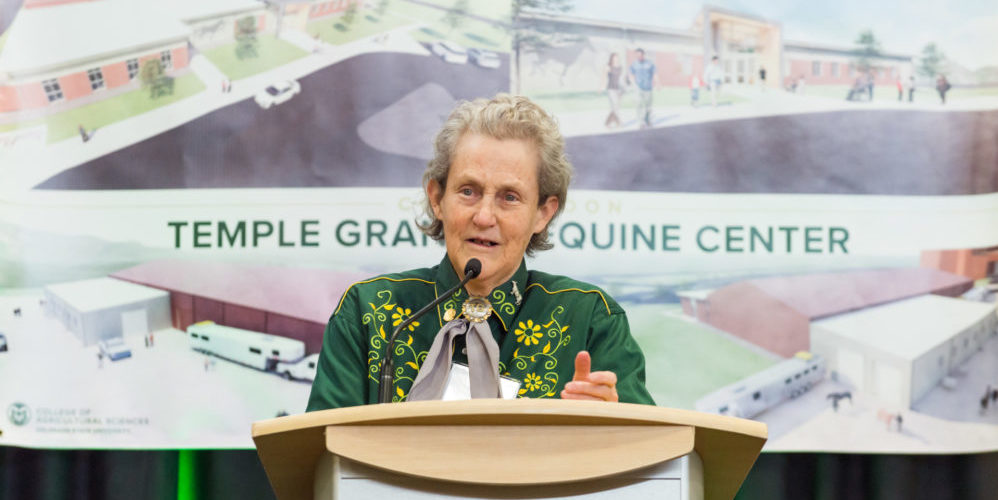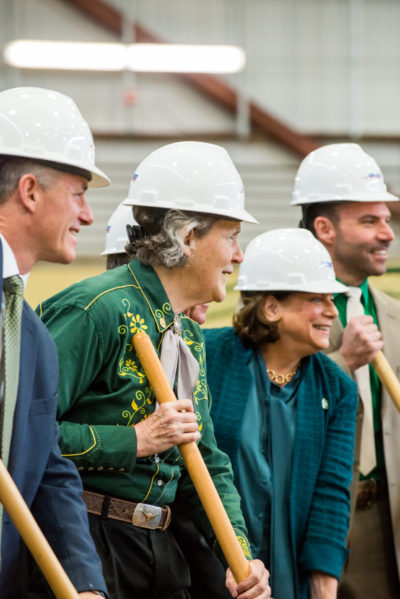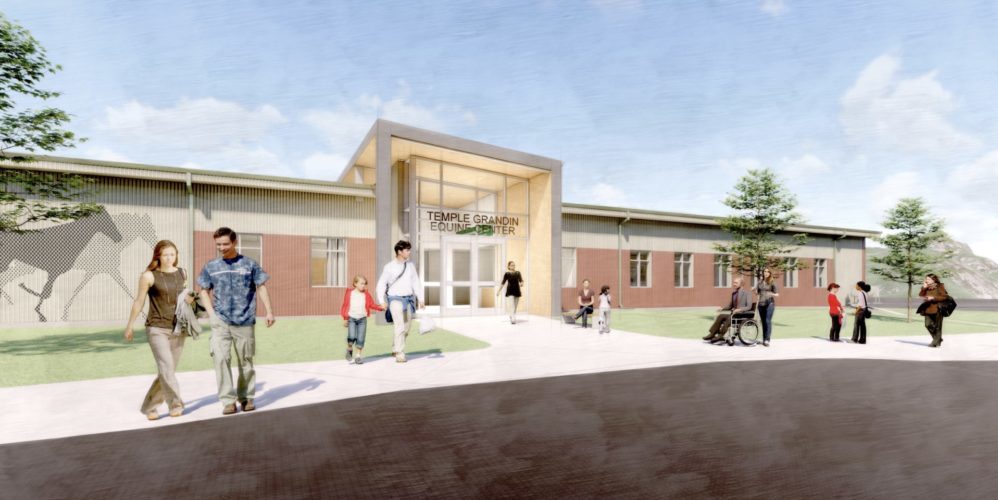
Temple Grandin, the world-renowned professor in Colorado State University’s College of Agricultural Sciences and autism advocate, didn’t have an easy road in life.
Far from it.
“High school was a disaster for me,” she said. “I was always getting picked on.”
She recalled the day she reached her breaking point when a student called her a derogatory term. “I chucked a book at her,” Grandin said.
‘Horses saved my life’
That incident got Grandin, now in her 30th year on the Department of Animal Sciences faculty, kicked out of school, but it also opened up a completely new world for her. Her new boarding school included opportunities to ride and work with horses.
“Horses saved my life,” she said. “I loved to ride them, and working in the barns taught me how to work. I fed them, took care of them and cleaned out nine stalls every day.”
It was fitting then, on Monday, Feb. 20, that CSU broke ground on the Temple Grandin Equine Center on the Foothills Campus. The new facility, adjacent to the B.W. Pickett Arena, will be home to what may be the leading equine-assisted activities and therapy (EAAT) research program in the world. It will serve children with autism, veterans with PTSD and seniors with Alzheimer’s or other dementias.
Two-phase project
The overall project, which includes two phases, is projected to cost $10 million. Construction on the first phase of the project, approximately $5 million – a 40,000-square-foot building featuring a riding arena, classrooms, horse stalls and space for CSU’s Right Horse program – will begin this spring. CSU has raised $4.7 million to date.

“Temple was our inspiration, so it’s appropriate this facility be named in her honor,” said Jerry Black, head of CSU’s Equine Sciences Program and one of the project’s original planners.
The project first was envisioned in 2014, and planning and fundraising began shortly thereafter. Grandin not only consulted on the facility’s design, she has been a donor and tireless advocate.
Two Temple Grandin centers
The Animal Health Complex at CSU’s SPUR Campus at the National Western Complex in Denver will also include programs hosted by the Temple Grandin Equine Center. Programs at that location will focus more on outreach than education and research; the facility is slated to break ground in April.
When completed, the Foothills Campus center will elevate CSU’s already renowned EAAT program. The leadership team has already invested thousands of hours in research and practical application, reviewing every known equine-assisted therapy-related study from around the world.
“We are now considered the leader in researching equine-assisted activities and therapy,” said Adam Daurio, director of the Temple Grandin Equine Center. “This will be a place where individuals with physical, emotional and developmental challenges can heal, where therapists can treat, where students can learn, where scientists can research, and where horses can be studied, cared for, and advanced. Our graduates already are the leaders in many aspects of this industry.”
Becoming the world leader
Daurio said CSU’s current EAAT programming already provides services for 70 people per week, and has successfully launched three tracks of research. Students – both undergrads and those working on advanced degrees – do the bulk of the hands-on research and partner with licensed practitioners and certified instructors to host appointments for participating children, veterans and seniors.
 Several key donors attended the groundbreaking, and CSU President Joyce McConnell told the gathering how proud she was of the program and the donors who helped make the facility a reality.
Several key donors attended the groundbreaking, and CSU President Joyce McConnell told the gathering how proud she was of the program and the donors who helped make the facility a reality.
“CSU is a place that dreams,” McConnell said. “It doesn’t surprise me that we will be the best in the world. We need to tell everyone else we are the best in the world because we are cutting-edge, and we are pushing the boundaries. And when we push the boundaries because of the research we do, we actually get it out into the world, so this gets to spread far and wide.”
You can donate to support the Temple Grandin Equine Center. CSU hopes to launch the next phase of the facility, which will include a second arena, advanced clinical and therapy facilities, and administration offices in 2024.



Leave a Reply